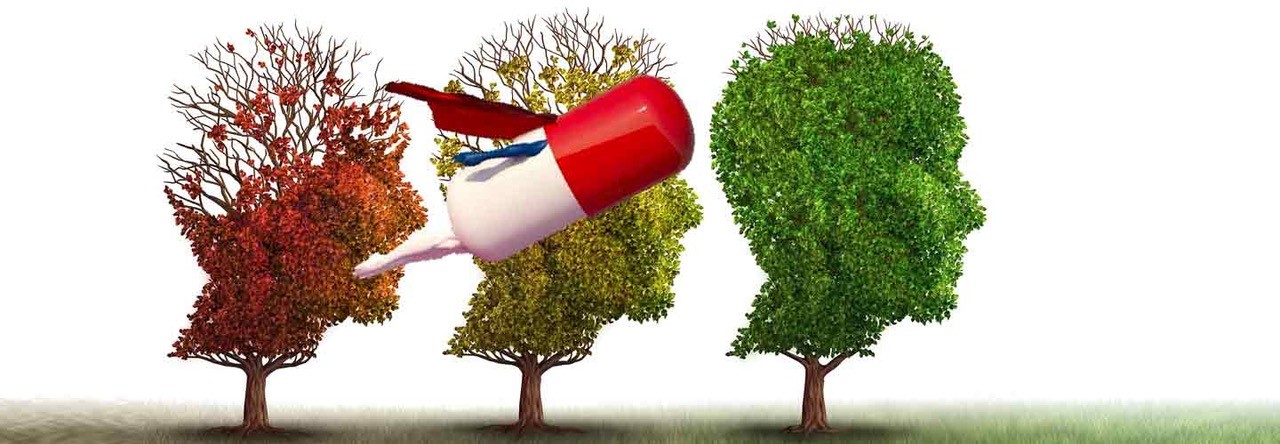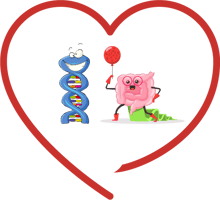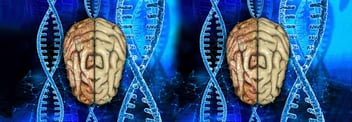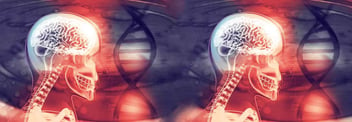Your Mighty Moody Microbiome – Part 15 Will Probiotics or Fecal Transplants Cure Memory Loss from Dementia?
- Home
- Blog

Reader, is it just me, or did the Holiday decorations hit the stores early this year? As soon as the clock struck midnight on November 1, or so it seemed, the Halloween candy at the grocery store was relegated to the discount bins, their precious shelf space repopulated with jolly holiday lights, trees, Santas, and more. End-of-the-year celebrations are great—but to jump from Halloween straight to the December festivities is to forget the most truly American holiday of them all: Thanksgiving! Unlike the spookiness of Halloween, the presents of Hanukkah and Christmas, or the patriotism of Independence day, Thanksgiving is fully and completely dedicated to the simple virtue of gratitude. To celebrate, all we must do is give thanks—for the food that blesses our table, and for the friends and family that join us in the feast.
Next week many of us will be sitting at that table with multiple generations of loved ones—from the children that will comprise a family unit’s newest generation to the family forebears: great grandmothers, grandfathers, aunts and uncles. And if your family is anything like mine, over the years the most special part of Thanksgiving has been the simple act of storytelling—listening in as the eldest, whose memories hold the rich details of family lore, tell beloved family tales to the youngest, imparting in them a sense of familial belonging and shared identity. It’s a beautiful tradition—but for many, it can also be painful. Every year that passes ages the oldest in the family, and some of our elders may begin to forget the stories that defined each generation that preceded them. As their memory declines, so does our access to the oral history of our families. Enduring Alzheimer’s Disease creates painful experiences for the entire extended family. While we can do our best to prevent its development, once it has fully developed there is no cure. That’s why today, I want to turn our series on the microbiome towards this progressive disease—and perhaps give the gift of hope in the process. You see, reader: like so many brain-related diseases we’ve gone over in the last few weeks, Alzheimer’s is intricately related to the workings of our gut bugs. And the more we begin to understand the relationship between the two, the more we can explore exciting new treatments that begin in the microbiome and end in the brain. Now that’s something to give thanks for!
Alzheimer’s: The Dreaded Diagnosis
For many of us, nothing is more terrifying than the prospect of “losing our minds”—and while this may feel like an imprecise term, it fits the symptoms of Alzheimer’s to a T. Alzheimer’s is a progressive disease plagued by a sense of forgetting, of loss, and ultimately of a fading awareness and a profound alteration of one’s very self. Those who suffer from Alzheimer’s may forget who you are, who they are, and the basic edifices through which they have come to understand the world around them. They may lose precious memories of people, places, and events that came to define them. It’s terrible to watch the disease take its course—but even more terrible is the feeling of helplessness and hopelessness when the diagnosis is made. You see, reader, for many years, it was thought that Alzheimer’s had neither a clear origin nor a clear treatment. Researchers believed the disease manifested without rhyme or reason, and any treatment doctors could administer to help patients diagnosed with Alzheimer’s was palliative—easing the hardships Alzheimer’s caused but doing nothing to ease the brain-degenerating disease process itself. Researchers have believed for decades that Alzheimer’s is primarily caused by the buildup of amyloid plaques and tau tangles in the brain, but only recently have they begun to hypothesize that the buildup of these plaques and tangles can begin decades before the diagnosis itself. And as it turns out, there are certain genetic predispositions that could lead to developing the Alzheimer’s.
As we’ve discussed in prior blogs on the topic, certain genes, including APOE, ABCA7, LRP1, CD33, and TREM2, may contribute to the development and progression of Alzheimer’s by predisposing individuals towards plaque and tangle buildup, an inhibited ability to clear plaques and tangles away, or toward chronic neuroinflammation—a ”predisease” highly correlated with the disease. Each of these genes can be tested via Genomind’s Mindful DNA test and lifestyle modifications like getting more sleep, a Mediterranean Diet or increasing levels of vitamin D (among many other types of interventions) may help to stave off the disease. But research is now confirming another part of our biological makeup that may be increasing our chances of developing Alzheimer’s over time—those trillions of gut bugs that make up our microbiome.[/vc_column_text][vc_column_text]
Are Your Gut Bugs Increasing Your Chances of Developing Dementia?
Depression, Bipolar, autism, ADHD—are there any mental illnesses that your gut bugs don’t touch? Frankly, reader, it seems the answer is no—and that’s because the gut and brain are so intricately connected. The microbiome is constantly sending the brain and central nervous system microbial messages—so-called “crosstalk”— via the gut-brain axis—and as it turns out, some of those messages may be increasing your chances of developing Alzheimer’s over time. Here are just two ways in which the connection may be having an impact:
First, it is clear what lives in our gut directly impacts the state of our brain. The amyloid β proteins that aggregate together to cause the initial damage to brain cells don’t just live in the brain—they live in the gut as well. While the properties of these molecules may differ depending on where they “live”, exposure to bacterial amyloid proteins in the gut may nonetheless prime the immune system and enhance an immune response to “endogenous production of neuronal amyloid in the brain.” Lipopolysaccharides, a component of bacteria cell membranes, have also been found to reproduce many of Alzheimer’s signature inflammatory and pathological features when injected into mice. In humans, bacterial lipopolysaccharides promote amyloid protein aggregation in the brain, and appear in greater amounts in the brains of Alzheimer’s patients, further suggesting a connection.
Second, researchers have shown that levels of a protein called calprotectin, an intestinal protein that binds calcium, are significantly increased in the cerebrospinal fluid and brains of patients suffering from Alzheimer’s. Calprotectin promotes amyloid aggregation in the brain and further contributes to neuroinflammation. Researchers suggest that a leaky gut may enable the protein may be “translocated” from the gut to the brain where it further inflames brain cells adding to the neurodegeneration that ultimately leads to Alzheimer’s.
A leaky gut is a major contributor to many mental illnesses and cognitive diseases—and it seems Alzheimer’s is very much the same. A dysregulated microbiome and damaged intestinal barrier can lead to toxins, incompletely digested food molecules, and harmful bacteria to transit from the gut to the brain, leading to significant inflammation, and contributing to the perpetuation, and even the relapsing/remitting nature of many mental illnesses. So what might we be able to do about it? If you’ve been following along with this series, you likely already know the answer: treat the brain by treating the gut!
Fecal Microbiota Transplants: The Alzheimer’s Treatment of the Future?
Reader, I have spoken with many patients who have direct and painful experiences with Alzheimer’s. Witnessing someone we care deeply about begin to lose their memory and cognitive capacities can make us fear for our own mortality, and question what is in our power to change. Luckily, there may be some good news on the horizon for Alzheimer’s treatment: research has shown that fecal microbiota transplantation alleviated the pathogenesis of Alzheimer’s in mice especially genetically vulnerable to its development. Humans with specific genetic variants of their APP and PS1 genes are more likely to develop Alzheimer’s earlier in life. When researchers administered fecal microbiota transplants in mice with these genes, they found cognitive improvement and reduced deposits of amyloid plaques. These researchers also found that consumption of probiotics had a positive effect on cognition in Alzheimer’s patients. It seems the time is ripe for more research along these lines—but the message we can take away now is certainly a hopeful one!
***
Reader, wherever your Thanksgiving may find you this year, I hope you—and your gut bugs!—end the day happy and well fed, surrounded by lots of love. And if you are hurting from watching the elderly in your own family suffer from cognitive decline, I hope this blog brings you and your family a silver lining of hope. Cheers to the holidays ahead!

Related Information
- Learn about Genetic Testing
- Learn about Potomac Psychiatry
- Meet Our Doctors
- Contact Potomac Psychiatry
.png?width=144&height=144&name=Untitled%20design%20(34).png)



